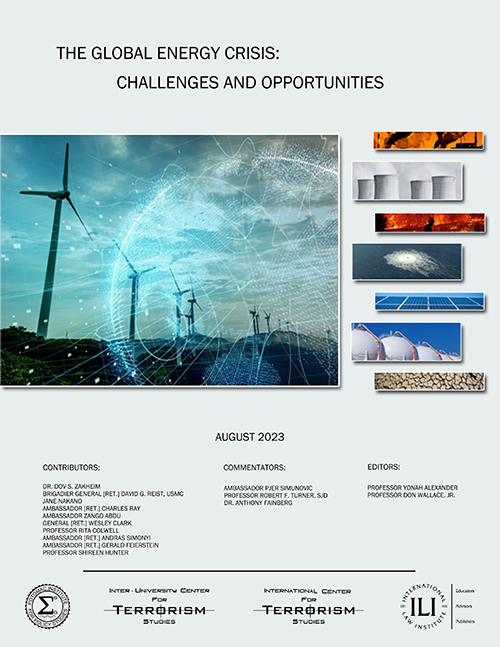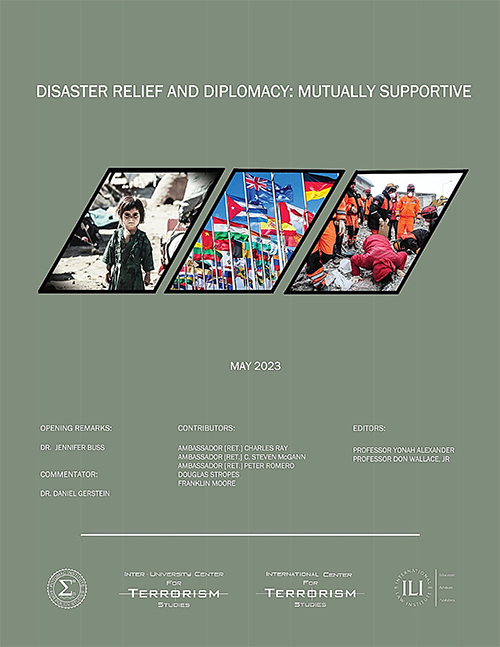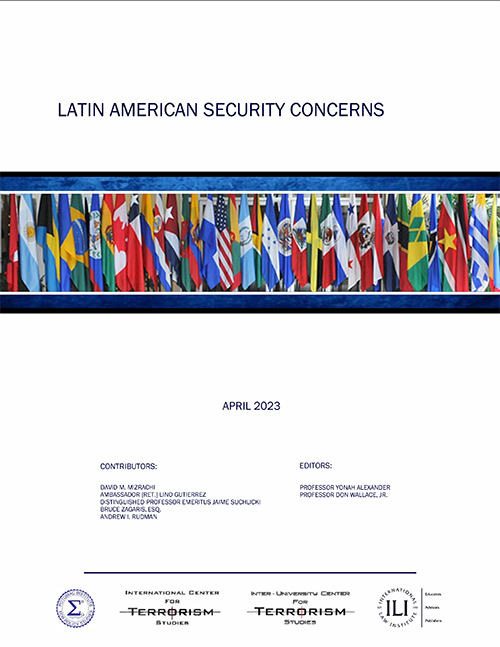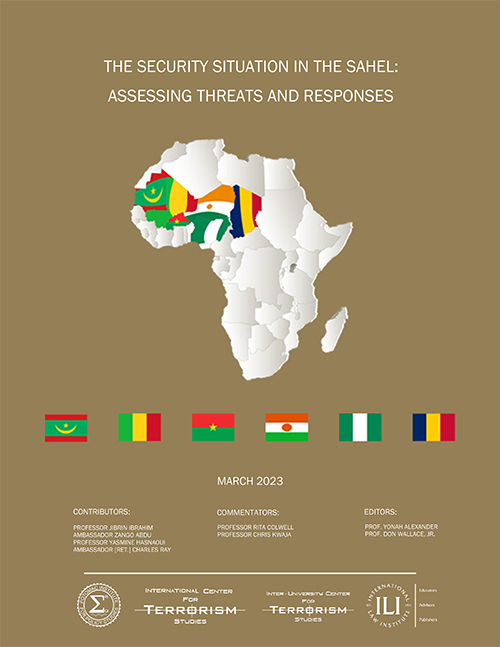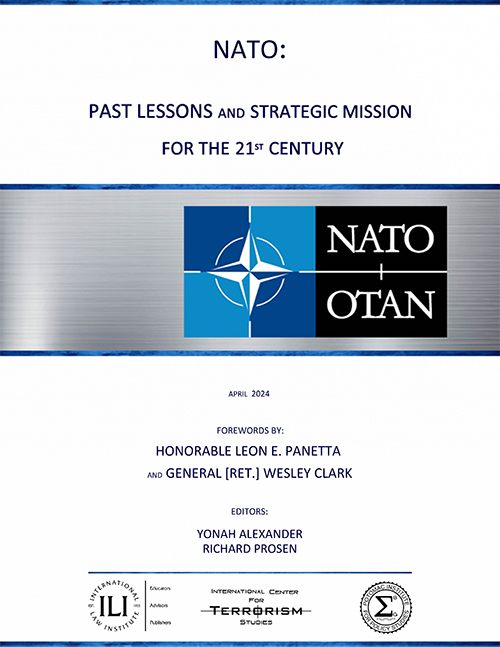 PROFESSOR YONAH ALEXANDER AND RICHARD PROSEN. EDITORS
PROFESSOR YONAH ALEXANDER AND RICHARD PROSEN. EDITORS
This publication is the second volume in a series focusing on the interdisciplinary aspects of the North Atlantic Treaty Organization (NATO) over the past eight years. The current publication consists largely of excerpts from multiple reports published by the Inter-University Center for Terrorism Studies in association with the U.S. Department of State (Office of European Security, Political and Military Affairs- EUR/RPM), the International Law Institute, and the Potomac Institute for Policy Studies.
Our previous research efforts resulted in the publication of a multi-authored book titled NATO: From Regional to Global Security Provider (Lexington Books, 2015) co-edited by Yonah Alexander and Richard Prosen. The book provided a six-part comprehensive analysis of the Alliance’s Strategic Concept and served as a relevant study of the most pressing issues facing NATO at the time. General (Ret.) Wesley Clark wrote a foreword to the study, and the other contributors included James Henry Bergeron, Derrick Busse, Georgiana Cavendish, Natividad Carpintero-Santamaria, Paul Dodge, R. David Edelman, Raffi Gregorian, Enrico Mueller, Patrick Murphy, Leslie Ordeman, Raphael Perl, Stefano Santamato, Carrie Shirtz, George Sinks, Bruce Weinrod, Richard Weitz, and Michael Ziemke. Recommendations for consideration and further discussion (i.e., the what and the how regarding future policy options for the North Atlantic Alliance) were highlighted.
The first report in the current work is titled “NATO: Confronting Regional and Global Challenges” (January 2016) was published by the Inter-University Center for Terrorism Studies, the Potomac Institute for Policy Studies, and the International Law Institute. This product highlighted the current challenges and future strategic responses of the Alliance in the aftermath of NATO’s Wales Summit held in the United Kingdom (September 4-5, 2014). In this report, Yonah Alexander and Richard Prosen provided an overview of NATO observing that the Euro-Atlantic defensive and offensive alliance is as relevant today as it was during the Cold War. Other contributors included Raffi Gregorian analysis of a case study on the Balkans, Patrick Murphy focused on NATO and Russia relationships, and General (Ret.) Wesley Clark offered insights on NATO’s future.
The second report “NATO's Strategy: Continuity or Change?” (January 2017) was produced by the Inter-University Center for Terrorism, the Potomac Institute for Policy Studies, the International Law Institute, the Center for National Security Law at the University of Virginia School of Law, and with the association of the U.S. Department of State. This publication was released shortly after the inauguration of the Trump Administration. It is based on a seminar on “NATO: Post Warsaw Agenda” which was held at the Potomac Institute for Policy Studies on October 31, 2016. This event followed the Alliance’s 28th summit in Warsaw, July 8-9 of that year. Yonah Alexander wrote an introduction and other contributors included Richard Prosen, Kenneth Wainstein, Joseph Manso, Daniel Hamilton, Jeffrey Rathke, and Jorge Benitez. During the event, other colleagues, including Ambassador Kurt Volker (former U.S. Ambassador to NATO; currently, Executive Director of the McCain Institute for International Leadership) and General (ret.) Alfred Gray (Twenty-Ninth Commandant of the United States Marine Corps; Senior Fellow and Chairman of the Board of Regents, Potomac Institute for Policy Studies) participated in the program and provided unique insights. Six months after the release on June 5, 2017, Montenegro joined NATO and several years later, North Macedonia joined NATO on March 27, 2020.
On February 24, 2022, Russia launched a coordinated full-scale invasion of Ukraine making history as the largest attack on a European country since World War II. This aggressive, unprovoked war created a grave humanitarian crisis and destabilized the geopolitical world order. On February 25, 2022, NATO leaders held a ‘virtual extraordinary summit’ and unanimously condemned Russia's attack on Ukraine – the gravest threat to Euro-Atlantic security in decades – and reiterated their support for Ukraine. NATO also stated that they would make all deployments necessary to ensure strong and credible deterrence and defense across the Alliance. On March 24, 2022, the NATO Brussels Summit was held. There, NATO leaders agreed to a set of proposals under the NATO 2030 reform agenda to: strengthen the Alliance as a forum for political consultations; reinforce collective defense through increased readiness, modernized capabilities and additional investments; and develop Alliance-wide resilience objectives to make societies less vulnerable to attack and coercion. The leaders also agreed that NATO’s next Strategic Concept would need to be ready before the next Summit in 2022 (Madrid).
The third report “NATO Strategic Lessons From the Russian Invasion of Ukraine” (July 2022) was a product of a Zoom Forum held on April 28, 2022, which focused on NATO members’ responses security challenges. A distinguished panel of U.S. and foreign experts discussed the outlook of NATO’s mission regionally and globally. This virtual discussion began with opening remarks by Professor Don Wallace Jr. (Chairman, International Law Institute) and was moderated by Professor Yonah Alexander (Director of the International Center for Terrorism Studies and Senior Fellow at the Potomac Institute for Policy Studies). The following distinguished panel of scholars and practitioners gave presentations and subsequent discussions; General (Ret.) Wesley Clark (Former Supreme Allied Commander Europe); Ambassador Robert Hunter (Former U.S. Ambassador to NATO); Major General (Ret.) Dr. Mihail E. Ionescu (Professor, National School of Political and Administrative Studies (SNSPA) Bucharest, Romania); Professor Herman Matthijs (University Ghent & Free University Brussels); Professor Natividad Carpintero-Santamaria (Professor at the Polytechnic University of Madrid (UPM) and General Secretary of the Instituto de Fusión Nuclear “Guillermo Velarde”); Professor Shimon Shetreet (Greenblatt Chair of Public and International Law, Hebrew University of Jerusalem; Former Cabinet Minister and MK, Israel); and Bruce Weinrod (Former Secretary of Defense Representative for Europe and former Deputy Assistant Secretary for European and NATO Policy. Closing remarks were delivered by General (Ret.) Alfred Gray, USMC (29th Commandant of the U.S. Marine Corps (1987-1991), and Chairman of the Board of Directors and Regents, Potomac Institute for Policy Studies).
At the NATO Madrid Summit on June 29-30, 2022, the 2022 NATO Strategic Concept was released. NATO's guiding document, reflected on the new security reality that emerged since the previous Strategic Concept was agreed in 2010. It identified Russia as the most significant and direct threat to Allied security, addressed China for the first time, and included other challenges like terrorism, cyber, and hybrid. The Strategic Concept also reaffirmed the commitment by Allies to spend at least 2% of Gross Domestic Product (GDP) on defense by 2024. Finally, Finland and Sweden were invited to join the Alliance. Finland formally joined NATO on April 4, 2023.
The NATO Vilnius Summit was held in Lithuania, on July 11–12, 2023. At the Summit, members boosted NATO's deterrence and defense by approving new regional plans to counter the two main threats to the Alliance: Russia and terrorism. Allies renewed their pledge to invest a minimum of 2% of GDP annually on defense. The Summit leaders endorsed a Defense Production Action Plan to accelerate joint procurement, boost interoperability, generate investment, and production capacity. NATO Leaders agreed on a multi-year assistance program for Ukraine, held the inaugural meeting of the NATO-Ukraine Council, and reaffirmed that Ukraine will become a member of NATO when Allies agree and conditions are met.

